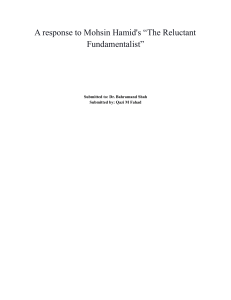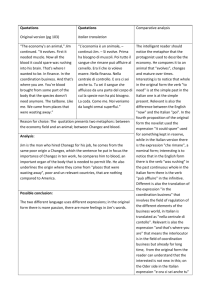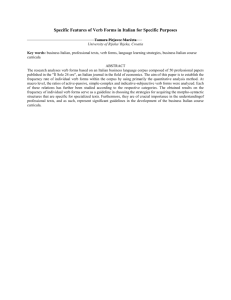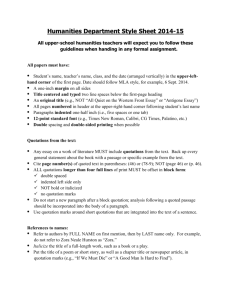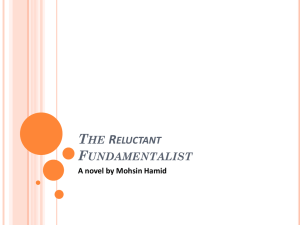LGrando - Significant quotations from "The
advertisement
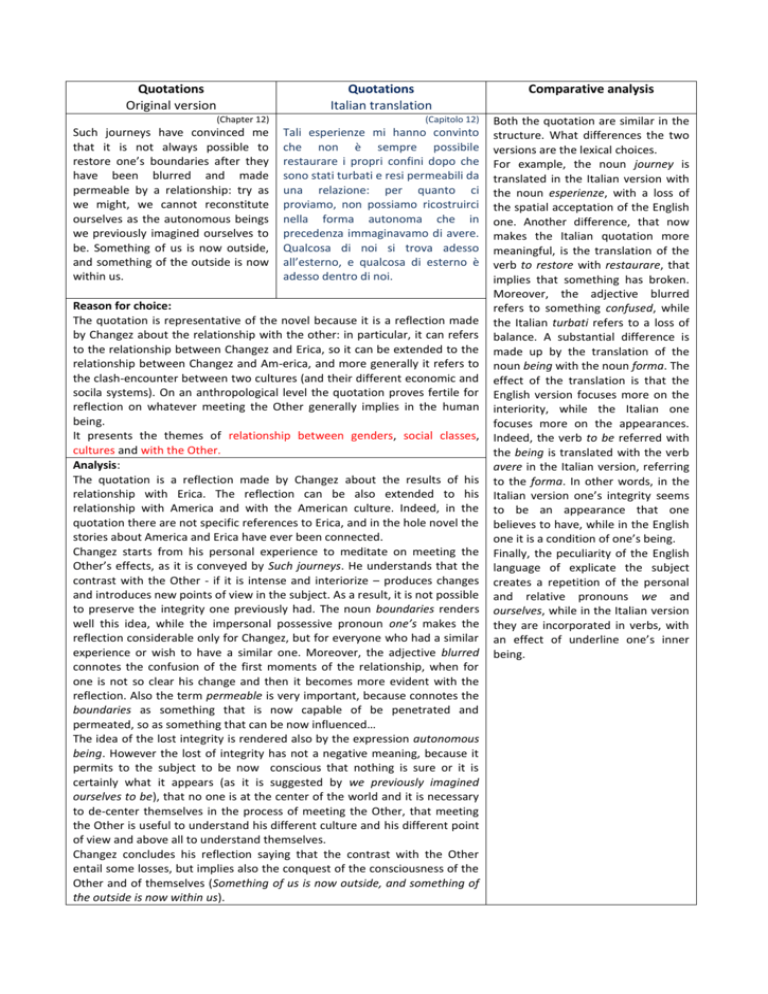
Quotations Original version Quotations Italian translation (Chapter 12) (Capitolo 12) Such journeys have convinced me that it is not always possible to restore one’s boundaries after they have been blurred and made permeable by a relationship: try as we might, we cannot reconstitute ourselves as the autonomous beings we previously imagined ourselves to be. Something of us is now outside, and something of the outside is now within us. Tali esperienze mi hanno convinto che non è sempre possibile restaurare i propri confini dopo che sono stati turbati e resi permeabili da una relazione: per quanto ci proviamo, non possiamo ricostruirci nella forma autonoma che in precedenza immaginavamo di avere. Qualcosa di noi si trova adesso all’esterno, e qualcosa di esterno è adesso dentro di noi. Reason for choice: The quotation is representative of the novel because it is a reflection made by Changez about the relationship with the other: in particular, it can refers to the relationship between Changez and Erica, so it can be extended to the relationship between Changez and Am-erica, and more generally it refers to the clash-encounter between two cultures (and their different economic and socila systems). On an anthropological level the quotation proves fertile for reflection on whatever meeting the Other generally implies in the human being. It presents the themes of relationship between genders, social classes, cultures and with the Other. Analysis: The quotation is a reflection made by Changez about the results of his relationship with Erica. The reflection can be also extended to his relationship with America and with the American culture. Indeed, in the quotation there are not specific references to Erica, and in the hole novel the stories about America and Erica have ever been connected. Changez starts from his personal experience to meditate on meeting the Other’s effects, as it is conveyed by Such journeys. He understands that the contrast with the Other - if it is intense and interiorize – produces changes and introduces new points of view in the subject. As a result, it is not possible to preserve the integrity one previously had. The noun boundaries renders well this idea, while the impersonal possessive pronoun one’s makes the reflection considerable only for Changez, but for everyone who had a similar experience or wish to have a similar one. Moreover, the adjective blurred connotes the confusion of the first moments of the relationship, when for one is not so clear his change and then it becomes more evident with the reflection. Also the term permeable is very important, because connotes the boundaries as something that is now capable of be penetrated and permeated, so as something that can be now influenced… The idea of the lost integrity is rendered also by the expression autonomous being. However the lost of integrity has not a negative meaning, because it permits to the subject to be now conscious that nothing is sure or it is certainly what it appears (as it is suggested by we previously imagined ourselves to be), that no one is at the center of the world and it is necessary to de-center themselves in the process of meeting the Other, that meeting the Other is useful to understand his different culture and his different point of view and above all to understand themselves. Changez concludes his reflection saying that the contrast with the Other entail some losses, but implies also the conquest of the consciousness of the Other and of themselves (Something of us is now outside, and something of the outside is now within us). Comparative analysis Both the quotation are similar in the structure. What differences the two versions are the lexical choices. For example, the noun journey is translated in the Italian version with the noun esperienze, with a loss of the spatial acceptation of the English one. Another difference, that now makes the Italian quotation more meaningful, is the translation of the verb to restore with restaurare, that implies that something has broken. Moreover, the adjective blurred refers to something confused, while the Italian turbati refers to a loss of balance. A substantial difference is made up by the translation of the noun being with the noun forma. The effect of the translation is that the English version focuses more on the interiority, while the Italian one focuses more on the appearances. Indeed, the verb to be referred with the being is translated with the verb avere in the Italian version, referring to the forma. In other words, in the Italian version one’s integrity seems to be an appearance that one believes to have, while in the English one it is a condition of one’s being. Finally, the peculiarity of the English language of explicate the subject creates a repetition of the personal and relative pronouns we and ourselves, while in the Italian version they are incorporated in verbs, with an effect of underline one’s inner being. Possible conclusion: The overall effect of the quotations is that the English one focuses more on the inner being, on the value of the internalization of the meeting of the Other, and engages more the reader creating a relationship between him and Changez. The final meaning of the quotation is that there are no boundaries between the cultures, or better that the defined geographical and political confines are not the cultural and the personal boundaries, that are on the other hand undefined. This permits to cultures to dialogue and permits the meeting of the Other. Quotations Original version Quotations Italian translation (Chapter 7) (Capitolo 7) I wonder now, sir, whether I believed at all in the firmness of the foundations of the new life I was attempting to construct for myself in New York. Certainly I wanted to believe; at least I wanted not to disbelieve with such an intensity that I prevented myself as much as was possible from making the obvious connection between the crumbling of the world around me and the impending destruction of my personal American dream. Adesso mi domando, signore, se credessi davvero alla solidità dei fondamenti della nuova vita che stavo cercando di costruirmi a New York. Di sicuro volevo crederci; o quanto meno non volevo non crederci, con una tale intensità da impedirmi di fare l’ovvia connessione tra il frantumarsi del mondo intorno a me e l’incombente distruzione del mio sogno americano. Reason for choice: The quotation is relevant because provides an example of Changez’s lack of certainties. As a consequence, he is attached to the security of his American life. Living in a different country and confronting a different culture produces on Changez (as they would produce on everyone) a fall of his security and his integrity. Looking back at that moment, Changez meditates on the truth of fundamentals he followed to not lose himself and to realize his dream. Themes of different culture’s meeting and of survey of identity. Analysis: Changez’s wonders about the real attachment to his American life. Indeed, looking back at the moment, he reasons about his faith in the American economic fundamentals. The word foundations has a different meaning in respect of the key-word fundamentals always used in the novel: it conveys an idea of stability that is not implied in the idea of fundamentals, in that foundation refers to the human being while fundamental only to his social role. The contrast between the adverbs certainly and at least, with the expression not to disbelieve testify well Changez’s insecurity and inner confusion. Finally, he attributes to the historical events his American dream’s fail, as it is conveyed by the word connection that connects the cause to the effect. Possible conclusion: The overall effect is that the English quotation seems to focus more on Changez’s introspection and on his confusion, while the Italian translation does not render well this. Moreover one effect of the translation is the loss of possible meanings that English language can convey using some terms instead of others. Comparative analysis Italian language translates the word foundations with the word fondamenti, modifying an important meaning: foundations literary refers to the foundation of a construction, while fondamenti refers to the base rules one has to respect for a particular result. The use of a complement of advantage in the English quotation and the corresponding Italian enclitic particle give a different importance to Changez’s inner being. Another difference is the verb disbelieve that is translated in Italian with the use of a double negation. Finally the Italian version doesn’t report the expression as much as was possible that connotes Changez’s ambiguity in noticing the connection: it’s not so clear if he doesn’t succeed or if he doesn’t want. Quotations Original version Quotations Italian translation (Chapter 9) (Capitolo 9) But as I reacclimatized and my Ma mentre mi riacclimatavo e surroundings once again became l’ambiente circostante tornava ad familiar, it occurred to me that the essermi familiare, mi resi conto che house had not changed in my non era la casa ad essere cambiata absence, I had changed; I was durante la mia assenza; ero io che mi looking about me with the eyes of a guardavo attorno con gli occhi di uno foreigner… straniero… Reason for choice: Changez’s consciousness of his change. He has adopted a different point of view from his real one. Themes of different cultures’ meeting and of different points of view. Analysis: Changez is conscious that he has adopted a different point of view after his permanence in America. Indeed, after understanding that, he finds his home and his own land as when he has leaved. He can now understand better an American person’s feeling in Pakistan and mainly he understands he had changed (is interesting to notice the similarity between the name Changez and the verb to change). The personal pronoun my and the expression about me testifies that Changez has ever considered Pakistan the true reality to which he belongs. Possible conclusion: The overall effect is that the English quotation focuses on Changez influenced by his American life: the protagonist seems to have adopted the point of view of an American worker of the upper society and the result is that he sees his homeland in a very different way. His change is very evident, while in the Italian version he seems to return from a touristic travel in which he had seen things so different that he has to accustom to his house. Comparative analysis The English verb became is translated in the Italian quotation with the verb tornava: the results is a different meaning. Indeed the first conveys the idea of the different point of view adopted, while the second the idea of a gradual getting used to see his home as he previously had ever been. Another differenc is that the Italian quotation insert the idea of Changez’s change in the expression referred to his way of looking as a foreigner, while the English version reports the change (that the house had not changed in my absence, I had changed vs non era la casa ad essere cambiata durante la mia assenza; ero io che mi guardavo attorno con gli occhi di uno straniero)

